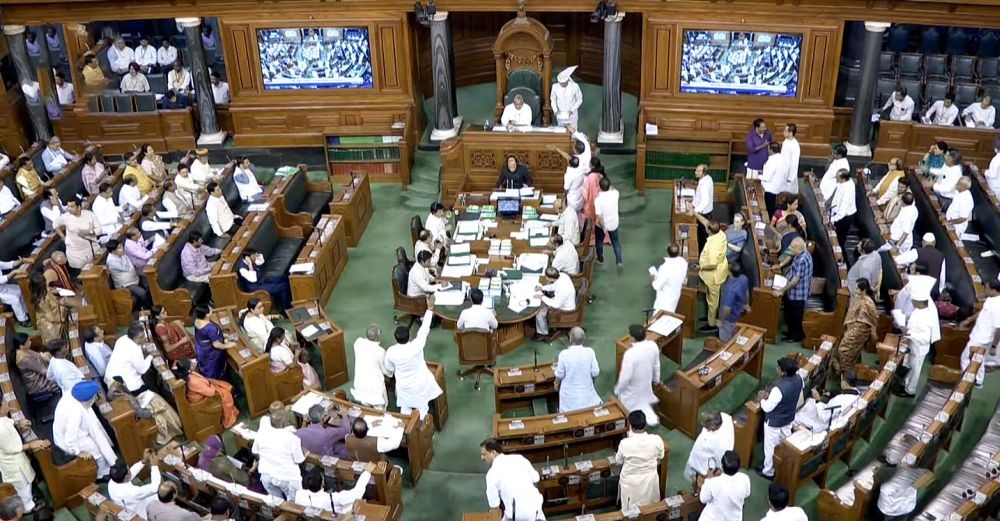Indian Environment Ministry statement in Parliament confirms Forest Conservation Act (Amendment) Bill 2023 proposed against Constitutional norms
PRESS RELEASE : Bangalore : 27th July 2023

A day after the Indian Ministry of Tribal Affairs (hereinafter ‘MoTA’) essentially confirmed that it has had no meaningful role in shaping the Forest Conservation (Amendment) Bill 2023 (hereinafter ‘FCA Bill’), the Indian Ministry of Environment, Forests and Climate Change (‘MoEFCC’) has confirmed in the Rajya Sabha that it has in no manner complied with the mandatory requirement of the Government of India (Allocation of Business) Rules, 1961 (hereinafter ‘Allocation of Business Rules’) in shaping the law. This is evident from the written statement of Shri Ashwini Kumar Choubey, Hon’ble Minister of State in MoEF&CC, in response to a question from Hon’ble Member of Parliament (Rajya Sabha) Shri. Aneel Prasad Hegde (annexed).
As has been explained in ESG’s release dated 27th July 2023,[1] MoTA should have been fundamentally involved, even co-leading, any amendment to any existing laws, or in shaping any new law, or in formulation of a policy or scheme, that are “relating to the rights of the forest dwelling Schedule Tribes on forest lands”. When what has been stated by MoTA and MoEF&CC in the Rajya Sabha are read together, it is glaring that the Ministries have not worked in conformance with the Doctrine of Harmonious Construction, as is the purpose of Article 77 of the Constitution of India that requires Government of India to follow due process meaningfully, not as a ritual, in protecting the nation and securing the rights of all of her citizenry.
MoEF&CC has no qualms about violating Constitutional propriety:
In its response to Rajya Sabha, MoEF&CC has claimed that “Forest (Conservation) Amendment Bill, 2023 has been proposed after carrying out inter-ministerial, State and public consultation”. It further states that a “note on the Bill has been circulated to all Ministries, including M/o Tribal Affairs”, and that a consultation paper[2] on the proposed amendments was circulated amongst the wide public in accordance with the Pre-Legislative Consultation Policy of the Government of India[3]. But it fails to specifically respond to the question if it indeed proposed amendments to Forest Conservation Act 1980 in coordination with MoTA and in conference with the Allocation of Business Rules. This is sine qua non when read also with the Preamble and Section 11 of the Forest Rights Act, 2006 (hereinafter FRA or Forest Rights Act, 2006).[4]
MoEF&CC has also failed to conform with the letter and spirit of the aforesaid Consultation Policy, a part of which states:
“Department/Ministry concerned should publish/place in public domain the draft legislation or at least the information that may inter aliainclude brief justification for such legislation, essential elements of the proposed legislation, its broad financial implications, and an estimated assessment of the impact of such legislation on environment, fundamental rights, lives and livelihoods of the concerned/affected people, etc.” (Emphasis supplied)
From MoEF&CC’s actions it is clearly evident that it has not only failed to conform with any of the requirements of this policy whilst proposing the FCA Bill, which is a non-trivial oversight particularly considering implications of FCA Bill on the rights of those who are intricately linked to forests, of the conservation and protection of forests in meeting the standards of the Principle of Intergenerational Equity and the July 2022 resolution of the UN General Assembly on the Human Right to a Clean, Healthy and Sustainable Environment.[5]

Specious claim about compliance with international commitments:
Further, MoEF&CC speciously claims that its actions in proposing the “Bill are in line with the policies of the government and international commitments”.
Principles 10 and 11 of the United Nations Conference on Environment and Development, Rio de Janeiro (Rio Declaration),[6] which India has ratified, specifically require signatory States when formulating environmental laws, regulations and norms to ensure:
“Principle 10
Environmental issues are best handled with the participation of all concerned citizens, at the relevant level. At the national level, each individual shall have appropriate access to information concerning the environment that is held by public authorities, including information on hazardous materials and activities in their communities, and the opportunity to participate in decision-making processes. States shall facilitate and encourage public awareness and participation by making information widely available. Effective access to judicial and administrative proceedings, including redress and remedy, shall be provided.”
“Principle 11
States shall enact effective environmental legislation. Environmental standards, management objectives and priorities should reflect the environmental and developmental context to which they apply. Standards applied by some countries may be inappropriate and of unwarranted economic and social cost to other countries, in particular developing countries.”
As is widely evident from several statements and protests against the FCA Bill from across India, MoEF&CC has not conformed with these Principles in any manner. The contents of the Bill, particularly, leave no room for doubt that its core purpose is to advance interests of extractive industries, to commercialise forests, and favour Indian and foreign corporates interested in exploiting forests, biodiversity, bioresources and associated traditional knowledge – particularly AYUSH[7] companies.[8]

Questionable reference to JPC:
Wilting under such wide ranging and widespread criticism to so amend the Forest Conservation Act, including when MoEF&CC suffered when it introduced the FCA Bill (on 29th March 2023) in the Lok Sabha, the Ministry chose to secure a review of the Bill by a specially constituted Joint Parliamentary Committee (JPC), not the subject Committee as is the Parliamentary norm.
Hon’ble Member of Parliament (Rajya Sabha) Shri. Jairam Ramesh (who was India’s Environment and Forests Minister during May 2009 to July 2011), led these protests. He also wrote on the same day to the Hon’ble Chairman of the Rajya Sabha Shri Jagdeep Dhankar[9] asserting:
“The Bill falls fairly and squarely in the domain of the Standing Committee on Science and Technology, Environment, Forests & Climate Change… Standing Committees are primarily to examine Bills. But they can do so only if Bills are allowed to be referred to them for scrutiny. By referring the Forest (Conservation) Amendment Bill, 2023 to a Joint Committee, the Union Government is deliberately by-passing the Standing Committee which would have subjected the legislation to detailed examination with the full participation of all stakeholders.”
Shri. Ramesh further highlighted that “(n)o member of the the Opposition figures in the list which is hopelessly one-sided.” Yet, this controversial Bill was referred to the JPC on 29th March 2023 and the Committee rushed to produce a final report on 20th July 2023[10]. (Emphasis supplied)
A review of the JPC report reveals no person who is a forest dwelling Schedule Tribe or other Traditional Forest Dweller (over 100 million in India belong to this category) was invited to depose before the Committee. In fact, the report records that except for former MP (Rajya Sabha) Ms. Brinda Karat, almost all non-official witnesses invited to depose before JPC were either retired forest officials or representatives of NGOs who are known to have systematically opposed forest rights, and some of who have been opposed to deeply democratic governance of India’s forests and natural resources.
Importantly, the JPC did not question MoEF&CC on the utter lack of compliance with Constitutional mandates in proposing and formulating the FCA Bill, especially given that it already had been forcefully iterated in the 324th Report of the Department Related Standing Committee on Science and Technology, Environment, Forests and Climate Change[11] that MoEF&CC must work with MoTA in proposing any changes to any policy or law relating to forests.

FCA Bill violates India’s Democratic Environmental Jurisprudential Traditions:
India has a long history of consultative law making. The 1980 N D Tiwari Committee Report on Environmental Protection,[12] on the basis of which the Environment Protection Act, 1986 was enacted, was the outcome of a year long consultation process which was conducted with committee members travelling nation wide and meeting various communities and experts. As Environment Minister, Shri. Jairam Ramesh held repeated nation-wide public hearings on multiple issues relating to environment, forest protection and biodiversity. Even the Solid Waste Management Rules 2016, which were formulated in accordance with the directions of the Hon’ble High Court of Karnataka (in WP 46523/2012),[13] involved nationwide public hearings.
There is no dearth of precedence of deeply democratic consultations that have preceded policy formulation and law making in India. All that MoEF&CC had to do was to study such precedents and follow those traditions and norms.[14] Yet, in a matter as fundamental as governing and protecting forests, and in securing the rights of millions who live in and are directly dependent on it, the Ministry chose to rush through this most controversial and retrograde Bill through the Lok Sabha. Now it intends to get the assent of the Rajya Sabha.
Disastrous law will have irreversible devastating consequences to India’s socio-economic and environmental security:
If this Bill becomes law, it will have direct and irreversible disastrous implications to conservation of forests, protection of forest rights and biodiversity. From what has transpired thus far, it is clear that MoEF&CC was in no manner interested in bowing to the will of the people of this country or conforming to Constitutional norms. The Bill reveals the Ministry’s true intent: to fundamentally weaken forest protection mechanisms and support reckless expansion of extractivist development into forests and ecologically sensitive areas, disregarding the brutal impact this would have on the nation’s ecological security, rights of tribals, and other traditional forest dwellers dependent on forests.
It is, therefore, imperative now for Hon’ble Members of the Rajya Sabha to rise in a bipartisan spirit to crush this destructive resolve of MoEF&CC and guide the nation out of the disastrous path this proposed FCA Bill will lead us to. The House of the Elders must marshall all their wisdom and unite across party lines to require MoEF&CC to withdraw the FCA Bill post haste. Rajya Sabha members must guide Ministers of MoEF&CC to conform with Constitutional mandates, follow Directive Principles of State Policy as set out in Part IV of the Constitution of India and propose such laws, policies, schemes, etc. that protect the interests of India, her extraordinary biodiversity and forests, and the interests of her peoples.
Nothing less will do at this stage
Leo F. Saldanha Bhargavi S. Rao Nidhi Hanji
Trustee Trustee Research Associate (Legal)
Environment Support Group
ANNEX
GOVERNMENT OF INDIA
MINISTRY OF ENVIRONMENT, FOREST AND CLIMATE CHANGE
RAJYA SABHA
UASTARRED QUESTION NO. 849
TO BE ANSWERED ON 27.07.2023
Consent of Ministry of Tribal Affairs in proposing amendments to Forest (Conservation) Act, 1980
849. SHRI ANEEL PRASAD HEGDE:
Will the Minister of ENVIRONMENT, FOREST AND CLIMATE CHANGE be pleased to state:
- (a) whether the Ministry has coordinated with and taken consent of the Ministry of Tribal Affairs in proposing amendments to Forest (Conservation) Act, 1980, as is mandatory as per Government of India (Allocation of Business) Rules, 1961 and Forest Rights Act, 2006; and
- (b) whether the Ministry has followed recommendations of DPSC on Science and Technology, Environment, Forests and Climate Change in its 324th report on ‘Status of Forest in India’, required compliance with aforesaid Rules while proposing to Parliament any matter relating to forests & forest rights, if so, details thereof?
ANSWER
MINISTER OF STATE IN THE MINISTRY OF ENVIRONMENT, FOREST AND CLIMATE CHANGE
(SHRI ASHWINI KUMAR CHOUBEY)
(a) & (b)
Forest (Conservation) Amendment Bill, 2023 has been proposed after carrying out inter-ministerial, State and public consultation. A note on the Bill has been circulated to all Ministries, including M/o Tribal Affairs. Moreover, a concept paper indicating the amendments proposed in the Act was also circulated among the general public for their comments as per the provisions of Pre- Legislative Consultation Policy of the Government of India. Based on the comments received from the Ministries, Public and stakeholders, including in vernacular languages, the Forest (Conservation) Amendment Bill, 2023 has been finalized by the MoEF&CC.
The provisions of the proposed Bill are in line with the policies of the government and international commitments, which is very well reflected in its preamble. Moreover the proposed Bill primarily intends to eliminate the ambiguities in the applicability of the Act in various lands and to combat the global issues pertaining to climate change, carbon neutrality, NDC, etc.
***
[1] See ESG Release dated 26th July 2023, In light of the controversial statement in Parliament by Ministry of Tribal Affairs on Forest Conservation Act (Amendment) Bill, 2023, Rajya Sabha must apply brakes on the controversial law, accessible at: https://esgindia.org/new/popular/rajya-sabha-must-apply-brakes-on-the-controversial-forest-conservation-act-amendment-bill-2023/
[2] Consultation Paper on Proposed Amendments in the Forest (Conservation) Act, 1980, accessible at: https://environmentclearance.nic.in/writereaddata/OMs-2004-2021/263_OM_02_10_2021.pdf
[3] This order is not easily accessible on any GOI website. It is however available at: ohttp://regulatoryreform.com/wp-content/uploads/2015/03/India-Pre-legislative-consultation-policy-2014.pdf. See also a release on the importance of conforming with it issued by the Minister of Law and Parliamentary Affairs on 10th February 2022, accessible at: https://pib.gov.in/PressReleaseIframePage.aspx?PRID=1797203
[4] Section 11 of the Scheduled Tribes and Other Traditional Forest Dwellers (Recognition of Forest Rights) Act, 2006 reads: “Nodal agency: The Ministry of the Central Government dealing with Tribal Affairs or any officer or authority authorised by the Central Government in this behalf shall be the nodal agency for the implementation of the provisions of this Act.”
[5] The Resolution can be accessed here: https://digitallibrary.un.org/record/3982508?ln=en
[6] https://www.cbd.int/doc/ref/rio-declaration.shtml
[7] Ayurveda, Yoga and Naturopathy, Unani, Siddha and Homeopathy
[8] This is also sought to be done by diluting the Biological Diversity Act, 2002, for which the Biological Diversity (Amendment) Bill, 2023 has already been rushed through Lok Sabha when the Opposition was protesting government’s failure to act in containing violence in Manipur.
[9] See tweet by Jairam Ramesh dated 29th March, 2023: https://twitter.com/Jairam_Ramesh/status/1641033679127343105/photo/1
[10]https://prsindia.org/files/bills_acts/bills_parliament/2023/Joint_Committee_Report_on_the_Forest_(Conservation)_Amendment_Bill_2023.pdf
[11]https://sansad.in/getFile/rsnew/Committee_site/Committee_File/ReportFile/19/108/324_2019_9_12.pdf?source=rajyasabha
[12] Report of the Committee for Recommending Legislative Measures and Administrative Machinery for Ensuring Environmental Protection, Chaired by Mr. Narayan Dutt Tiwari, Minister for Planning & Deputy Chairman of Planning Commission of India, Department of Science and Technology, Government of India, 15th September 1980.
[13] See compilation of documents relating to Environment Support Group and ors. Vs. State of Karnataka and ors., WP 46523/2012, accessible at: https://esgindia.org/new/pils/esgs-initiatives-on-socially-just-and-ecologically-progressive-management-of-municipal-solid-waste-including-pils-2/
[14] Panchayat (Extension to Scheduled Areas) Act, 1996, Biological Diversity Act, 2002, Right to Information Act, 2005 and Forest Rights Act, 2006 were all enacted after multiple consultations and deeply democratic debates and discussions nationwide.

